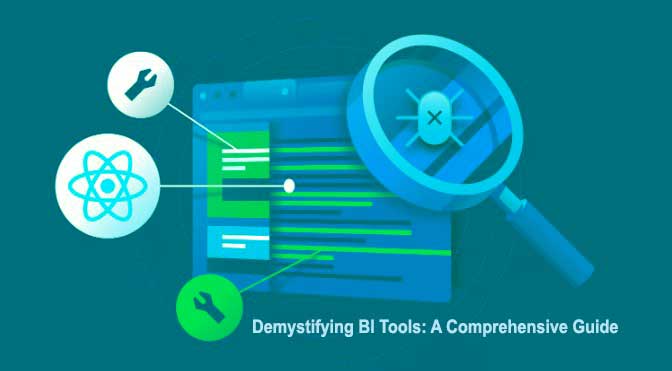Demystifying BI Tools: A Comprehensive Guide

Business intelligence (BI) tools are software applications that help businesses collect, analyze, and visualize data to extract meaningful insights.
Answer various business questions
BI tools can be used to answer a variety of business questions, such as:
What are my best-selling products?
Which customers are most likely to churn?
Where should I open my next store?
How can I improve my marketing campaign?
BI tools come in many forms, from on-premises solutions to cloud-based services.
Popular BI tool
Some popular BI tools include:
Tableau
The Power of BI
Qlik Taste
Viewer
Micro Strategy
BI tools can be used by businesses of all sizes and in all industries. However, these tools can be complex and expensive, so it’s important to choose the right BI tool for your needs.
How to choose the right BI tool
When choosing a BI tool, there are several factors to consider:
Your needs: What specific BI goals do you have? What data do you have? Once you understand your needs well, you can start identifying BI tools that can help you achieve your goals.
Your budget: BI tools can cost anywhere from a few hundred dollars to tens of thousands of dollars. It’s important to set a budget before you start shopping for BI tools.
Your technical skills: Some BI tools are easier to use than others. If you have limited technical skills, you may want to choose a BI tool designed for non-technical users.
How to get started with BI tools
Once you choose a BI tool, you need to start using it. This may involve:
Collect and prepare your data: Before you start analyzing data, you need to collect it and prepare it for analysis.
This may involve cleaning data, formatting data, and loading data into BI tools.
Create BI dashboards and reports: BI dashboards and reports are used to visualize your data and extract meaningful insights. Once you have loaded the data into the BI tool, you can start creating BI dashboards and reports.
Train your employees on how to use BI tools: Once you have created BI dashboards and reports, you need to train your employees on how to use BI tools.
This will help your employees get the most out of BI tools.
Benefits of using BI tools
BI tools offer a number of benefits to businesses, including:
Better decision making: BI tools can help businesses make better decisions by providing insights into their data.
These insights can be used to identify trends, opportunities and risks.
Increased efficiency: BI tools can help businesses increase their efficiency by automating tasks such as data preparation and analysis. This frees up employees to focus on more strategic tasks.
Reduce costs: BI tools can help businesses reduce costs by identifying areas where they can save money. For example, BI tools can be used to identify inefficient processes and unprofitable products.
Conclusion
BI tools can be a valuable asset for businesses of all sizes. By using BI tools, businesses can make better decisions, increase efficiency, and reduce costs.